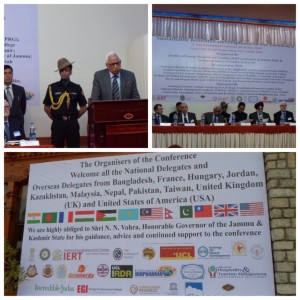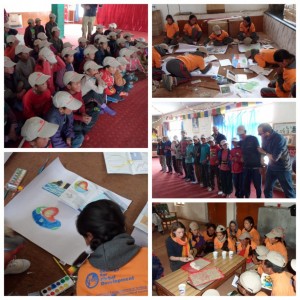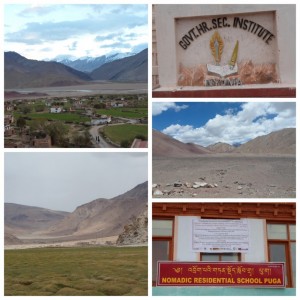Since we last posted about our programme in Ladakh (India) we have participated in a three-day international conference on sustainable resource development in the region, undertaken a 400 km round trip through the heart of the Himalayan mountains to visit and teach at two remote schools, and learn a lot in the process! We will continue to post more detailed analysis in the coming days/weeks – but here is a quick update on what we have been doing!
Conference
 The conference, held in Leh, gathered scientists (academics and practitioners) from across the geosciences (hazards, climate, water, geothermal energy, petrology, structural geology, geotourism – and much more) to explore issues of sustainable resource development. It was particularly helpful to be joined by some social scientists, policy makers and other stakeholders. The conference benefitted from some strong discussion sessions – often lacking at many conferences.
The conference, held in Leh, gathered scientists (academics and practitioners) from across the geosciences (hazards, climate, water, geothermal energy, petrology, structural geology, geotourism – and much more) to explore issues of sustainable resource development. It was particularly helpful to be joined by some social scientists, policy makers and other stakeholders. The conference benefitted from some strong discussion sessions – often lacking at many conferences.
It was very interesting (and welcome) from a development perspective that (i) the importance of genuine participatory approaches and community empowerment, (ii) strong communication and (iii) enhanced education were all repeatedly emphasised as being important. In projects from hydropower to geothermal, disaster reduction to water resource management – they were noted. Often this was in answer to questions of ‘how do we do this better’ or ‘how can we improve sustainability.’
There is an obvious challenges of how we as geologists enhance our ability to utilise these skills – none of which are simple. We certainly believe that GfGD has a strong and important role to play in supporting skills development in young geoscientists, and hope that other more mature projects and examples of these skills are given a greater prominence in geoscience education, training and continued professional development.
School/Education Programme
 Following our first programme at St. Peters school in Leh – Joel and Rosalie from GfGD travelled with a team from the University of Jammu to two further schools. These schools, in Nyoma and Puga, included a large intake from nomadic communities – with children residing at the school. The journey to the schools was remarkable – following the Indus River through the Himalaya – observing spectacular erosional features, rock formations and one or two sites with geothermal activity.
Following our first programme at St. Peters school in Leh – Joel and Rosalie from GfGD travelled with a team from the University of Jammu to two further schools. These schools, in Nyoma and Puga, included a large intake from nomadic communities – with children residing at the school. The journey to the schools was remarkable – following the Indus River through the Himalaya – observing spectacular erosional features, rock formations and one or two sites with geothermal activity.
At the school in Nyoma we worked with ~50 students, teaching on natural resources, glaciers and climate change and hazards (landslides and earthquakes). The students took home key messages on what causes a disaster, forces in a slope (and what alters them), and earthquake dynamics (what causes them, wave types, and what to do in an earthquake). At Puga, many of the children were very young. We did an interactive session on earthquakes – including slinky spring and people-particle demonstrations of P and S waves, and what to do in an earthquake. The ‘duck, cover, hold’ message was particularly emphasised here.
Both of these schools are set in beautiful areas – but the environment also brings many challenges. Extreme cold weather, possible isolation and the potential for other hazards are just a few examples. It is easy to romanticise about the incredible landscapes surrounding their schools and homes, but important not to forget that it comes with a cost. It was a great opportunity for us to highlight how an understanding of geoscience can reduce their vulnerability.

